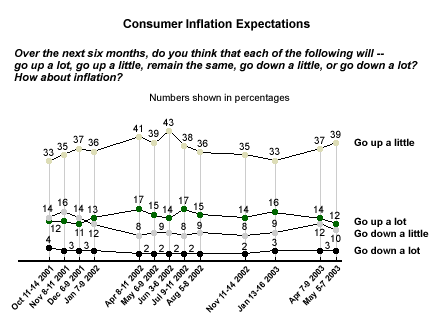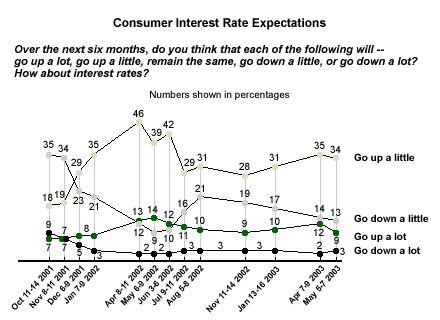Ever since the Fed met earlier this month, the idea of an unanticipated large drop in inflation, or even deflation -- an actual drop in consumer prices over a period of time -- has received a great deal of public attention. Friday's Labor Department report that consumer prices plunged 0.3% in April -- the biggest drop since October 2001 -- simply added fuel to the deflation debate.
Is the U.S. economy headed down the same deflationary road as the Japanese economy, and possibly the German economy? Are we doomed to struggle with deflation and economic stagnation in the years ahead? Does the current jobs recession increase the prospect for deflation? And most importantly, are American consumers expecting deflation? New Gallup Poll economic data provide some key insight to these questions.
Consumers Expect Inflation Rate to Increase
While many on Wall Street and in the business community are talking about deflation, few consumers expect declining prices. Half the public expects inflation rates to go up over the next six months, according to a recent Gallup Poll conducted May 5-7*. In sharp contrast, only 13% of American consumers expect inflation to decline in the months ahead, and only 3% of those consumers think inflation rates will go down a lot. These current figures are fully consistent with consumer expectations over the past year. Further, the 38-percentage-point margin between the percentage of consumers expecting inflation rates to go up and the percentage expecting inflation to decline is substantially higher than 27-point margin in October 2001.

Consumers Also Expect Interest Rates to Go Up . . .
Given these inflation expectations, it is not surprising that 43% of American consumers also expect interest rates to go up over the next six months. Again, this contrasts sharply with the 16% who expect interest rates to decrease in the months ahead, and as with inflation, only 3% think interest rates will go down a lot. Significantly, these consumer expectations are nearly the reverse of those held by consumers during October 2001, when only 25% of the public thought interest rates would increase, and 44% thought they would decrease.

. . . But Consumer Expectations Are Fragile
On Friday, the University of Michigan reported that its preliminary numbers show consumer confidence increasing in early May. As we reported last week, this improvement in consumer sentiment is based on an increase in the public's future expectations for the economy at the same time that consumer ratings of current economy are declining. Further, Gallup's data show that more than half of Americans expect economic growth to accelerate over the next six months, while only 20% expect it to decelerate.
As long as American consumers expect economic conditions to improve in the months ahead, there is little danger that deflation will become a problem. Instead, given consumers' current optimism about the future, recent declines in energy and other prices may actually stimulate the economy. Lower prices provide more spending power for the consumer, which could translate to increased sales.
On the other hand, consumers need to see a real improvement in the economy if they are going to maintain their expectations for the future. And businesses need to see consumers increasing their spending -- providing businesses with added pricing power -- before they are going to invest more and hire new employees. In this context, the current jobs recession and the continuous effort of businesses to increase profits by reducing jobs poses the threat of potential deflation in the future.
Unfortunately, I continue to believe that current consumer expectations are extremely fragile. Hopes for an improving economy have been dashed repeatedly during recent years, and current economic data do not support the idea that things will get better fast enough for the consumer to see a real improvement in the near term.
That means policy-makers may now have a fairly narrow window of opportunity as far as consumer optimism is concerned. They need to get the economy growing enough to produce new jobs. We need both fiscal and monetary stimulus in the immediate term if the chance of deflation in the United States is going to remain improbable much longer.
*Results are based on telephone interviews with 1,005 national adults, aged 18 and older, conducted May 5-7, 2003. For results based on the total sample of national adults, one can say with 95% confidence that the maximum margin of sampling error is ±3%.

